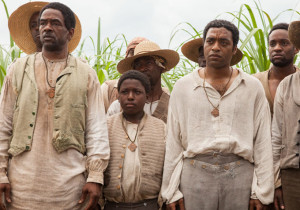
Can anybody make a serious, imaginative movie about slavery without being either ignored or picked at? Quentin Tarantino spent almost as much time shaking off flak for his flamboyant genre goof Django Unchained as he did taking bows and counting money. When Jonathan Demme made Toni Morrison’s Beloved into a far-better-in-hindsight movie in 1998, not even the Great and Powerful Oprah’s approbation of, and involvement in its production could make black people assemble en masse to see it when it was released. (Or anybody else. The cost was about $58 million; the movie made about $23 million, at best.)
At least, nobody’s ignoring 12 Years a Slave. It’s at or near the top of just about everybody’s year-end list of best movies. As of the second week of December, it’s made more than $35 million in American ticket sales with more expected around the bend in advance of Oscar season. Still, the movie has attracted its own high-visibility flak from such critics as Armond White, who believes Steve McQueen’s often-graphically violent rendering of Solomon Northrup’s testament as “torture porn” and “less a drama than an inhumane analysis.” David Edelstein, though he believed the movie “smashingly effective as melodrama,” is less fond of McQueen’s “cold, stark, deterministic” approach to the material.
For the record, I admired 12 Years a Slave far more than I loved it. An American/Hollywood director, no matter how smart or savvy, wouldn’t have trusted as much visually as McQueen does here. (In case you didn’t know, he’s black and British.) He isn’t afraid of stillness, of the tension and energy that reside in the act of waiting, as in the first frame, which in just showing the barely contained anxiety in the faces of slaves, gets the movie moving. That said, I doubt very much I will want to see it again. Do I need to watch, once again, a thin young woman getting whiskey tumblers thrown at her head and then having her back stripped of her ebony skin the way you strip a tree of its bark? I do not – and part of me wonders who would, or who needs to.
Still, because the movie is directed by a black man and is written by another (novelist John Ridley), 12 Years a Slave doesn’t get the same mauling Steven Spielberg’s Amistad (1997) received in some precincts for making ciphers of its mutinous African slaves and using their rebellion as a vehicle for white nobility. And I doubt very much the contrarian attacks on McQueen and his film will keep it from winning more awards; any more than Django’s critics kept Tarantino from collecting a screenwriting Oscar.
But no amount of gold statuettes will stop the haters from jumping on the next filmmaker who wants to take yet another hard, idiosyncratic shot at America’s Original Sin. The only solution: Take more shots, make more movies, go as odd, off-base, strange, funny, stern, cold, hot or heavy as the market can bear – and then, if you’ve got the gall, go further than that. There’s no dearth of material to draw upon, from the still largely undiscovered country of slave narratives to contemporary fiction by African American writers who are claiming autonomy over their ancestral experience through daringly imaginative means.
You like lists. Here are places to go for such material:
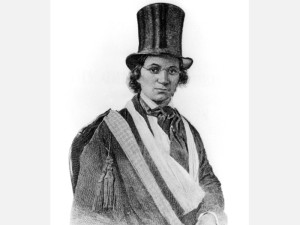
William and Ellen Craft – True story: They were married in bondage in 1846 and escaped two years later from Georgia to Philadelphia in disguise; she (above) as an invalid white man and he as “his” valet. It would take someone with an equally attuned ear for both injustice and comedy, but it could be done.
The Good Lord Bird – Being this year’s surprise National Book Award winner, James McBride’s picaresque comic saga of a young slave boy mistaken as a girl by abolitionist John Brown has likely attracted a few cautious glances from Hollywood. Sophisticated historical satires aren’t exactly meat-and-potatoes fare for multiplexes, no matter who’s involved. But it would be funny, again, if the right tone is struck.
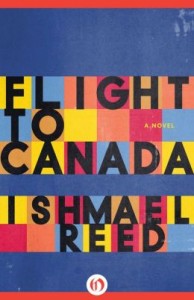
Flight to Canada — An Ishmael Reed seriocomic pastiche that’s never received the credit it deserves for initiating a wave of black novelists claiming imaginative autonomy over their ancestral past in daring, often incendiary fashion. I can’t begin to imagine who would make a movie out of it or what kind of movie it would be. But whenever or however it’s done, it’ll be different from anything that came before.
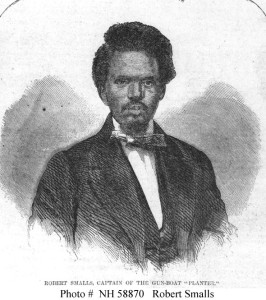
Robert Smalls Steals a Rebel Ship– Another true story; this one about a slave (above) who in 1862 commandeered a cotton freighter with a crew of 17 fellow escapees and managed to hide his identity from Confederate checkpoints, even Fort Sumter, towards the open sea until he was able to raise a white flag to Union blockaders. That alone would be a good movie, though it was just the beginning for Smalls, who later became one of the few African Americans to serve in the U.S. House of Representatives during Reconstruction. (Speaking of which, don’t you think that by now, some great movie about black folk during Reconstruction could be made to counter that damned Birth of a Nation? Just add it to the wish list.)
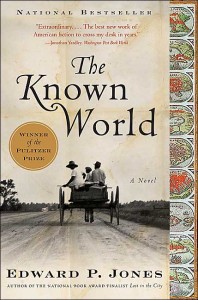
The Known World – Edward P. Jones’ award-winning novel about blacks owning black slaves already made readers’ heads spin off their necks. A movie version could magnify the shock-and-awe and I’m being REALLY optimistic when I say it could be done. But I’m betting it wouldn’t cause nearly as much trouble as…
The Confessions of Nat Turner – And, yes, I mean William Styron’s version, which has been cherished and despised in near-equal measure by black and white readers alike. America wasn’t ready for Turner in the 1830s and they still aren’t ready for him in whatever form he’s presented or imagined. Which doesn’t mean it shouldn’t be attempted.
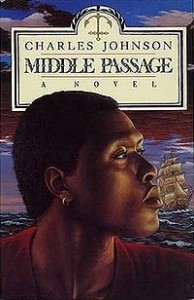
Middle Passage and Oxherding Tale — A pair of thinking-person’s ripsnorters by Charles Johnson; the former, as with 12 Years a Slave, puts a freed slave in harm’s way as he finds himself aboard a raucous slave ship heading back to Africa to pick up more “chattel.” The latter chronicles the adventures of a half-white-half-black slave negotiating his way through both worlds with philosophic insight and canny resourcefulness.
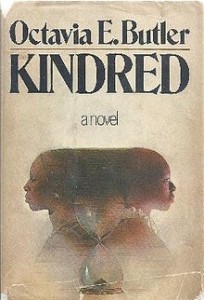
Kindred — Let me quote from an Amazon review of the late Octavia Butler’s breakthrough SF novel: “Dana, a black woman living in Los Angeles in 1976, is inexplicably transported to 1815 to save the life of a small, red-haired boy on Maryland’s Eastern Shore. It turns out this small boy, Rufus, is one of her white slave owning ancestors, who she knows very little about. Dana continues to be called into the past to save Rufus, and frequently stays long periods of time in the slave owning South. The only way she can get back to 1976 is to be in a life threatening situation.” How is this NOT a movie waiting to happen? Why hasn’t it happened by now?
And on and on and…
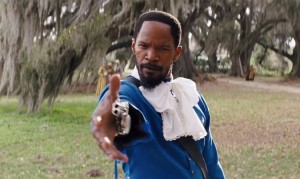
NOTE: I’ve also written a piece for CNN.com covering most of the same ground here. If you want to compare or contrast, click here.
IMMEDIATE REACTION: If loving Django Unchained is wrong, then I don’t…well, let’s see. What is it exactly I don’t want to be? That is the question. One of many…
Let’s tip off with a question that may not have an immediate or easy answer: Which movie better empowers black audiences? An historic drama, more or less factually-based, in which white men argue over and eventually move towards ending slavery – if not racism? Or an historic fantasy, rife with vulgarity, anachronism and impropriety, in which a freed black slave lays waste to every white southerner impeding his reunion with his wife — and gets away with it?
I am not asking which is the better movie, Lincoln or Django Unchained. Both have their problems. But it’s possible, despite their flaws, to enjoy them both for what they are, while accepting what they are not. I did not expect Lincoln to be much different from any other Steven Spielberg movie (though, until the ending, it is) and I certainly didn’t expect Django to be anything other than a Quentin Tarantino movie (and it is, only more so, for better and worse.)
For whatever it’s worth, my issues with the movie have more to do with craft than substance. I think Django talks too much, even for a Tarantino movie; and I also think that many of its scenes go on for too long, almost as if the movie’s afraid to let go of whatever effect it thinks it’s making with those people in the dark. It occurs to me, as well, that Tarantino’s been ripping himself off too cavalierly. I watch the set-pieces of wholesale slaughter and think, if I didn’t know any better, I’d swear I was watching Kill Bill Vol. 1 and the Japanese have been turned into southern whites.
Still, I couldn’t help myself. I laughed at Don Johnson and his night-riding stooges throwing hissy fits over whether to keep their masks on. I was almost touched by the slave girl’s impromptu bon mot aimed at Django’s baby-blue fop’s outfit. “You’re free…and you want to dress like that?” I didn’t buy any of it. But I was into it. And part of me hates myself for it. But I’m not sorry I saw it.
All right, then. So what am I asking? Get comfortable. I’m going to digress.
Back in 2006, I reviewed Blood Diamond for Newsday, giving it the two stars I routinely doled out to generic Hollywood mediocrity. I acknowledged the importance of the movie’s theme, which was the exploitation and wholesale murder of black Africans for the sake of the pink diamond trade. But I found myself chafing over the way this movie, along with so many of its kind, depicted its dark-skinned characters “as wholesale cannon fodder, doomed-but-noble ciphers or sneering bloodthirsty sociopaths.” I also lamented how the always-exemplary Djimon Hounsou, cast as a fisherman from Sierra Leone searching for his captured son, was used mainly as a vehicle through which the morally indolent white mercenary played by Leonardo DiCaprio Finds His Humanity (or something like that). At one point, Hounsou’s character even wonders aloud whether his people’s black skin constitutes some sort of curse “and [that] we were better off when the white man ruled.” No one, certainly not DiCaprio’s character, bothers to engage, much less contradict, this query. And, of the movie’s critics, I recall only the Nation’s Stuart Klawans calling the movie on this odious hogwash.
This is how I ended my own review:
“I suppose we should be grateful that there have been so many commercial features in recent years (“Hotel Rwanda,” “The Constant Gardener” among them) that pay attention to Africa’s woes. But even the best of them seem to writhe from hopelessness to despair and back again. Maybe what the continent needs are some empowering pulp myths far beyond the hoary model of Tarzan. A good start would be to cast Hounsou as the lead in a movie about the Black Panther, Marvel Comics’ first superhero-of-color. An African king who’s both a world-class physicist and a supreme martial artist may not be plausible, but he could broaden moviegoers’ sense of what’s possible.” (ITALICS ADDED).
Some readers, at least those who got that far, seemed to have a problem with this notion. One used the word, “infantile” (which over time I’ve accepted as a back-handed compliment). But what is so childish about African American audiences wanting their on-screen counterparts (or surrogates) to be more than merely victims? I believe even white audiences get excited when conventional expectations, especially in race and cultural matters, are upended, if not exactly transcended.
This is the excitement I hear from people after they’d just seen Django Unchained. I doubt whether any of these viewers bought their tickets with the expectation of seeing some historically faithful saga of antebellum life, and neither did I. They were buying a comic book. Many people have a grievance against the very notion of comic books, but I don’t. I understand that comic books as a medium are limited in what they offer their clientele. So are the movies, especially those who cruise the multiplexes for loose coin. Expect a movie or a comic book to explain everything about anything and all you earn is surplus sadness in your life that you don’t really need.
Even with the narrowest expectations about historical veracity, however, things get complicated when the subject matter is American slavery, European Holocaust or any number of similar assaults upon humanity. Hence the reaction to Django, after less than a month of swimming in the mainstream, ranges from sheer exhilaration to outright hostility, with the usual gradations in between.
Much of the resentment seems aimed exclusively towards Tarantino himself; a visceral dislike which I think has a lot to do with Spike Lee’s outright refusal to see the movie, tossing grenades at it all the way. Ishmael Reed, writing in the Wall Street Journal, believes Tarantino shows willful, if not willed ignorance of history, both American and cinematic. He writes: “To compare this movie to a spaghetti western and a blaxploitation film is an insult to both genres. It’s a Tarantino home movie with all the racist licks of his other movies.” Reed aimed this laser shot at the Oscar-nominated actor who plays the treacherous “house slave”: “Samuel L. Jackson…plays himself.”
I doubt Jackson felt the blow. He has, in fact, further provoked the movie’s antagonists by running straight at an interviewer asking about the movie’s prolific use of the “N-word,” refusing to answer the question unless the reporter, who is white, actually says the dread epithet aloud. (He didn’t.)
Though I disagree with Reed’s conclusions, I think everyone who saw Django should read his piece for its flying shrapnel of loose insight and, most important, its disclosure of what has always been a relevant source of disquiet: The debate over whether white artists have the right to tell any part of the black American story – which, as Reed writes, is as old as Uncle Tom’s Cabin.
It is also as recent as 1967 when the white southern novelist William Styron published The Confessions of Nat Turner, a Pulitzer Prize-winning novel told in the first-person voice of the brilliant-but-doomed leader of an 1831 slave rebellion. The outcry from African American novelists was so intense that a collection of essays, William Styron’s Nat Turner: Ten Black Writers Respond was published a year later. When I was a credulous, anxious-to-please teenager, I was so in thrall to the authority exerted by those black writers that for decades afterwards, I refused to even go near Styron’s book.
I still haven’t read it. But I plan to, because I now believe that James Baldwin, a friend of Styron who was one of the few African American authors speaking out on the book’s behalf, had the right take from the beginning: “I will not tell another writer what to write. If you don’t like their alternative, write yours.”
It’s still sound advice – and in the intervening years, black authors have taken it. Indeed, if anyone’s earned the right to rail at Django, it’s Ishmael Reed since, unlike Spike Lee, he’s actually created his own antebellum thriller that’s as funny, provocative and calculatedly anachronistic as Tarantino’s. I can almost hear Reed erupting with outrage over the sheer notion of my comparing Django with his 1976 book, Flight to Canada. But as I insisted to friends and fellow readers at the time (and continue to do so), even with all its musical-comedy interludes, burlesque elements and television cameras, Reed’s shrewd take on the slave-narrative genre had more trenchant, telling and useful things to say about the Peculiar Institution than Alex Haley’s Roots, which was ascending, that same year, to the rare stature of pop-cultural phenomenon. When Haley’s book became a television mini-series, it affected America’s racial attitudes as nothing of its literary kind since…Uncle Tom’s Cabin. No one’s bothered to do anything with cinematic Flight to Canada. Or, for that matter, with Charles Johnson’s Oxherding Tale and Middle Passage, two other antebellum satiric adventures written by an award-winning black author.
In 1987, there was Toni Morrison’s Beloved, which did get adapted for the big screen eleven years later by Jonathan Demme. But even with Oprah Winfrey’s imprimatur as producer and co-star, the movie earned about $26,000,000, roughly half of its $50,000,000 budget. And while all I have is anecdotal evidence, I remember many of my African American relatives and friends who told me they were not going to see Beloved, no matter how good it was or who was in it, because they simply did not want to watch a movie about slavery, or its legacy.
This reluctance to engage with the subject of slavery is duly noted in Jelani Cobb’s ruminative take on Django:
“In my sixteen years of teaching African-American history, one sadly common theme has been the number of black students who shy away from courses dealing with slavery out of shame that slaves never fought back. It seems almost pedantic to point out that slavery was nothing like this. The slaveholding class existed in a state of constant paranoia about slave rebellions, escapes, and a litany of more subtle attempts to undermine the institution. Nearly two hundred thousand black men, most of them former slaves, enlisted in the Union Army in order to accomplish en masse precisely what Django attempts to do alone: risk death in order to free those whom they loved. Tarantino’s attempt to craft a hero who stands apart from the other men—black and white—of his time is not a riff on history, it’s a riff on the mythology we’ve mistaken for history. Were the film aware of that distinction, Django would be far less troubling—but it would also be far less resonant. The alternate history is found not in the story of vengeful ex-slave but in the idea that he could be the only one.”
Cobb’s ambivalence approaches my own point-of-view, even though I still liked the movie better than he did. As with other critics, he laments Django’s lapse into revenge-movie mode. I lament the fact that almost EVERY big-studio film is built for revenge, even romantic comedies. (What, after all, is Skyfall but the mother-of-all-revenge-fantasies with different agendas for vengeance overlapping and colliding into each other like a freeway pile-up?) No matter. If Django Unchained did nothing else but arouse re-examination of “the mythology we’ve mistaken for history,” then all the trouble and fuss it’s caused will have been worth it.








